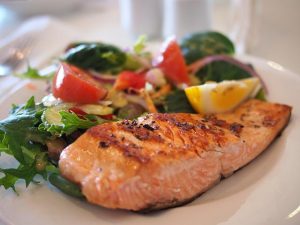 The health benefits of seafood are numerous. The Omega-3 fatty acids found in seafood are beneficial to our health, fighting the risk of blood clots and other cardiovascular problems. In addition, they contain calcium, amino acids, and Vitamin D. Whether you prefer to eat fish, shrimp, lobster, crab, scallops, crab legs, or a variety of other seafood, you’re guaranteed to reap the benefits of these foods.
The health benefits of seafood are numerous. The Omega-3 fatty acids found in seafood are beneficial to our health, fighting the risk of blood clots and other cardiovascular problems. In addition, they contain calcium, amino acids, and Vitamin D. Whether you prefer to eat fish, shrimp, lobster, crab, scallops, crab legs, or a variety of other seafood, you’re guaranteed to reap the benefits of these foods.
Omega-3 fatty acids in seafood reduce the risk of blood clots
Research shows that consuming omega-3 fatty acids from fish, poultry, and shellfish can help prevent blood clots. Omega-3s help prevent the formation of these clots by reducing platelet activity. Generally, your platelet count tells you how likely you are to develop a blood clot. However, if your platelet count rises too high, your blood may become too sticky and clump together. This can lead to major health issues.
Vitamin D in seafood boosts immune system
Seafood is full of vitamins and minerals, including vitamin D, that support the immune system. Fish, clams, and oysters are especially rich in these vitamins, and they pair well with other food groups. They also have a number of B vitamins, which are crucial for immune cell activation. In addition, seafood is a good source of iron, which supports healthy skin and nails. It’s also easy to find B vitamins in seafood.
Fish protein is a good source of amino acids
A high-quality fish protein is beneficial for human health. Amino acids are essential building blocks for proteins, which regulate key metabolic pathways. The amino acid lysine is the most important and should comprise at least 5.5% of the total protein. It is important to note that the composition of fish protein is different from that of humans. For example, it is not uncommon for fish to contain high levels of lysine.
Fish is a good source of calcium
While milk is a rich source of calcium, it is not the best source. Fish contains much more calcium, including sardines and salmon. One serving of canned sardines has 34% of the daily value of calcium. Sardines are also a great source of vitamin D, which is important for calcium absorption. The omega-3 fatty acids in salmon are also important for bone health.
Fish is a good source of vitamin B12
If you’re looking for a good source of vitamin B12 for your health, fish should be at the top of your list. Atlantic sardines, for example, contain 343% of the RDI for vitamin B12. In addition to B12, these fish are high in zinc, phosphorus, and selenium, which are essential for a healthy metabolism. Also, cod is a good source of vitamin B12 and omega-3 fatty acids.
Fish is a good source of protein
The benefits of eating fish are numerous. High protein levels can lower the risk of various diseases, including heart disease, diabetes, and digestive cancer. In addition, omega-3 fatty acids found in fish have an effect on the body’s metabolism, boosting the resting and exercise metabolic rates. Even older women can benefit from the benefits of eating fish. Moreover, you can choose seafood that contains fewer contaminants.
Fish is a good source of vitamin A
You should try to consume 2 servings of fatty fish each week. This way, you will get the recommended daily allowance of vitamin A. A serving of fatty fish contains about 600 mg of vitamin A. Fish also contains good amounts of preformed vitamin A (retinol), which is found in animal products. Fish oil provides an excellent source of vitamin A, and one teaspoon of cod-liver oil provides the daily recommended allowance of vitamin A.
Fish is a good source of vitamin D
Fish contains a lot of vitamin D, so it’s a great choice for health-conscious people. One of the best sources of vitamin D is Atlantic Herring, which contains about 216 IU per 3.5-ounce serving – 27% of the DV. Canned sardines are another great choice, but be sure to read the label carefully to see how much is actually in each serving.
Fish is a good source of vitamin C
Generally speaking, raw liver, and fish are excellent sources of vitamin C. Raw meat and other animal products contain lower amounts of vitamin C, so supplementation is unnecessary. In addition to vitamin C, fish, and raw liver contain omega-3 fatty acids, B vitamins, and minerals such as phosphorus and calcium.
